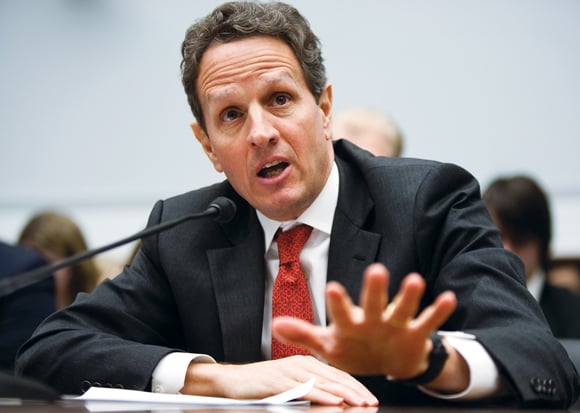A panel of federal financial regulators did on Tuesday what the Securities and Exchange Commission failed to do over the summer — release for public comment a proposal to reform money market mutual funds.
The Financial Stability Oversight Council approved by voice vote three recommendations that it said would protect the $2.7 trillion money fund market from runs like the one that forced the Reserve Primary Fund in 2008 to lower its net asset value to less than the traditional $1 return.
The council recommended three options: Allow the NAV to float, establish a 1% capital buffer combined with redemption restrictions or maintain a 3% capital buffer with other steps that could lower the capital requirement.
The proposal is similar to one that the SEC tried to issue in August. SEC Chairman Mary Schapiro, a staunch reform advocate, was rebuffed when she could not cobble together a three-person majority among the five SEC commissioners to approve the release.
The council's recommendations will now be available for a 60-day public comment period.
“Our purpose is to get the best possible public input so that this council and the commission itself can consider how best to proceed,” said Treasury Secretary Timothy Geithner. “Our preferred course is for the SEC to take this back and propose on its own a set of options for moving forward.”
At any time, the SEC can reclaim ownership of the money-fund reform process, according to Mr. Geithner. Doing so would require three commissioners to agree on a proposal.
The SEC's failure to act this summer stemmed in part from fierce financial industry lobbying against further money-fund reforms. It asserted that changes made in 2010 that increased the liquidity of funds and improved the quality of the debt instruments they could hold were sufficient.
Ms. Schapiro has made money funds a priority, advocating since November 2011 for changes that she says would better protect investors and taxpayers by preventing runs and subsequent government intervention required.
“Today's action means that meaningful structural reforms … can be published and allow us to benefit from the public's input,” Ms. Schapiro said at the FSOC meeting. “We are fully committed to taking the actions necessary and making the tough calls required to avoid the type of financial collapse that this nation experienced in the fall of 2008.”
“The fund industry has engaged consistently on this issue for more than four years, offering ideas and detailed analysis,” F. William McNabb III, chairman and chief executive of The Vanguard Group Inc., said in a statement issued by the Investment Company Institute. “It’s deeply disappointing that the council has proceeded without giving due weight to the views of fund sponsors, investors and the issuers who depend upon money market funds for vital financing.”
Opponents of further money fund reform say their entreaties have fallen on deaf ears.
“While we appreciate and will respond to the FSOC’s invitation for other reform ideas, we are disappointed by the proposals featured in the FSOC’s release,” Paul Schott Stevens, ICI president and chief executive, said in the statement.
The financial industry asserts that the Reserve Primary Fund run was the exception that proves the rule and that money funds are stable vehicles that play a crucial role in the markets.
Federal Reserve Chairman Ben Bernanke differs on that point. At the FSOC meeting, he maintained that the money funds have structural vulnerabilities.
“The basic run issue has not been solved at this point,” Mr. Bernanke said.







